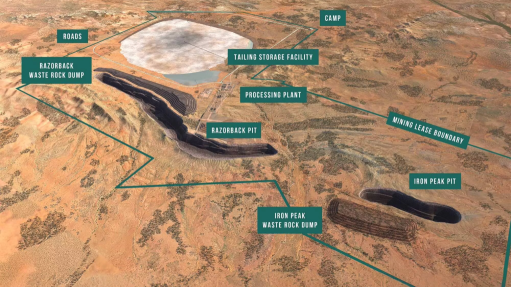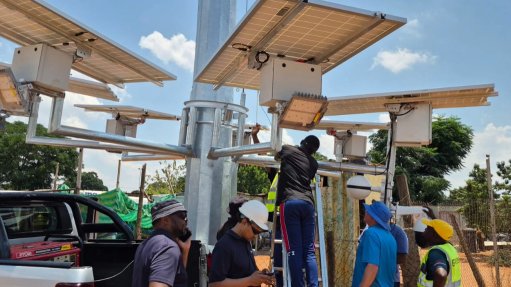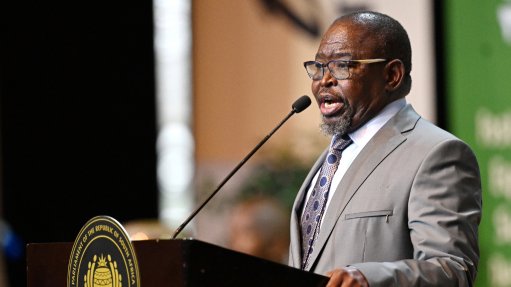With IMF loan granted, govt has a chance to embed pro-growth economic reforms
North West University Business School economist Professor Raymond Parsons says the timing of the International Monetary Fund’s (IMF’s) loan to South Africa again emphasises the extent to which the country has reached a defining fork in the road in dealing with challenges and that a clear sense of economic direction is now imperative.
The IMF granted a rapid financing facility (RFF) of about R70-billion to help South Africa deal with the socioeconomic impact of Covid-19.
The supplementary budget announced by Finance Minister Tito Mboweni has showed that it is unavoidable that South Africa will need recourse to additional foreign borrowing in current economic circumstances.
Parsons points out that, whereas many other economies experienced interrupted positive growth owing to Covid-19, for South Africa, the pandemic deepened an existing recession.
He explains that, against this background, the IMF’s special loan facility is a cheap source of finance that formally excludes the IMF’s usual stringent structural adjustment conditions.
Its basic purpose is indeed to be an emergency loan intended to tide South Africa over a very difficult economic and fiscal situation badly aggravated by Covid-19. Yet, in securing the special IMF loan, the country has apparently willingly made commitments which will enable it to repay the debt.
“To do so, there must therefore now be demonstrable urgency and resolve in stabilising the policy outlook for the economy and investors. The existing policy commitments have in effect become a self-imposed ‘structural adjustment agenda’ for South Africa and one against which the country’s future economic performance will be tested.
“This means that the policy pledges made in the supplementary budget must steadily be met and that the country actively seeks to remedy chronic problems such as the excessive public sector wage bill, widespread corruption, poor delivery, weak infrastructural development and dysfunctional State-owned enterprises.”
Parsons highlights that efficiency, stability and consistency in official decision-making is required to begin to reduce policy uncertainty, even before the pandemic is over, so that sustained job-rich growth can eventually take over where short-term economic recovery leaves off.
The assurance by Mboweni that the RFF funds will indeed be dedicated to alleviating the devastating burden which the pandemic has thrown on the economy is welcome, Parsons adds.
He further notes that the credibility of what has already been promised in terms of overall economic and fiscal policy is nonetheless now at stake. How South Africa fares post-Covid-19 depends not only on how quickly its economy and society recover from the present Covid-19 lockdown but also on how soon it can break out of its “low growth trap” through a tangible commitment to implementing pro-growth structural reforms.
“The immediate economic recovery in South Africa broadly hinges on trends in the world economy, the efficacy of the economic support measures taken so far, and the successful implementation of the lockdown exit strategy.
“The IMF loan helps us to better manage this process. But it also highlights the present watershed apparent in the country’s future economic direction. Hence the time now bought must be used wisely and soon. Drift is the enemy of delivery. And additionally the IMF’s special loan must also eventually be repaid within three to five years.”
That said, Mboweni has already warned that, if current fiscal trends persist, South Africa faces the danger of a sovereign risk debt crisis by 2023/24. Tough decisions and good overall economic steersmanship are therefore still needed to ensure that South Africa averts that outcome.
“The urgent implementation of pro-growth economic reforms can help South Africa to ultimately ‘grow out of its debt’, if it plays its cards [right]. The challenge now is to prove the sceptics wrong,” says Parsons.
Article Enquiry
Email Article
Save Article
Feedback
To advertise email advertising@creamermedia.co.za or click here
Press Office
Announcements
What's On
Subscribe to improve your user experience...
Option 1 (equivalent of R125 a month):
Receive a weekly copy of Creamer Media's Engineering News & Mining Weekly magazine
(print copy for those in South Africa and e-magazine for those outside of South Africa)
Receive daily email newsletters
Access to full search results
Access archive of magazine back copies
Access to Projects in Progress
Access to ONE Research Report of your choice in PDF format
Option 2 (equivalent of R375 a month):
All benefits from Option 1
PLUS
Access to Creamer Media's Research Channel Africa for ALL Research Reports, in PDF format, on various industrial and mining sectors
including Electricity; Water; Energy Transition; Hydrogen; Roads, Rail and Ports; Coal; Gold; Platinum; Battery Metals; etc.
Already a subscriber?
Forgotten your password?
Receive weekly copy of Creamer Media's Engineering News & Mining Weekly magazine (print copy for those in South Africa and e-magazine for those outside of South Africa)
➕
Recieve daily email newsletters
➕
Access to full search results
➕
Access archive of magazine back copies
➕
Access to Projects in Progress
➕
Access to ONE Research Report of your choice in PDF format
RESEARCH CHANNEL AFRICA
R4500 (equivalent of R375 a month)
SUBSCRIBEAll benefits from Option 1
➕
Access to Creamer Media's Research Channel Africa for ALL Research Reports on various industrial and mining sectors, in PDF format, including on:
Electricity
➕
Water
➕
Energy Transition
➕
Hydrogen
➕
Roads, Rail and Ports
➕
Coal
➕
Gold
➕
Platinum
➕
Battery Metals
➕
etc.
Receive all benefits from Option 1 or Option 2 delivered to numerous people at your company
➕
Multiple User names and Passwords for simultaneous log-ins
➕
Intranet integration access to all in your organisation

















